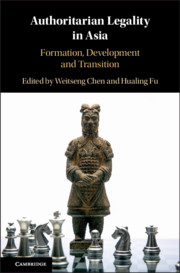Book contents
- Authoritarian Legality in Asia
- Authoritarian Legality in Asia
- Copyright page
- Contents
- Tables
- Notes on Contributors
- Acknowledgments
- Abbreviations
- Introduction Authoritarian Legality, the Rule of Law, and Democracy
- Part I Framework
- 1 Authoritarian Legality in East Asia
- Part II Authoritarian Legality
- Part III Authoritarian Legality in Transition
- Index
1 - Authoritarian Legality in East Asia
What, Why, and Whither?
from Part I - Framework
Published online by Cambridge University Press: 14 July 2020
- Authoritarian Legality in Asia
- Authoritarian Legality in Asia
- Copyright page
- Contents
- Tables
- Notes on Contributors
- Acknowledgments
- Abbreviations
- Introduction Authoritarian Legality, the Rule of Law, and Democracy
- Part I Framework
- 1 Authoritarian Legality in East Asia
- Part II Authoritarian Legality
- Part III Authoritarian Legality in Transition
- Index
Summary
Authoritarian legality is widespread, diverse, and enduring in East Asia. This chapter first addresses definitions of authoritarian legality in East Asia. Authoritarian legality falls between liberal rule of law and lawless autocracy. Cases include Hong Kong, Singapore, and more indisputably authoritarian polities in the region. Although exhibiting considerable variation, East Asian authoritarian regimes generally score relatively high in rule-of-law metrics and share several regionally distinctive legal–political characteristics.This chapter then turns to the paradox of why authoritarian rulers and regimes in East Asia would incur the risks and costs associated with increases in, or relatively high levels of, legality. It considers several functions that legality can perform for authoritarian rulers, and discusses examples from historical and contemporary East Asian cases: managing threats to order and security; fostering economic development; strengthening state capacity; legitimating authoritarian rule; and responding to demand for greater legality (from society and from elites, including within the regime).Finally, the chapter considers possible future trajectories for authoritarian legality in East Asia, again drawing on past and current examples: resilience and adaptation; transformation to democratic legality; regime political and legal decay; authoritarianism without legality; and lingering elements of authoritarian legality in a democratized polity.
Keywords
- Type
- Chapter
- Information
- Authoritarian Legality in AsiaFormation, Development and Transition, pp. 17 - 58Publisher: Cambridge University PressPrint publication year: 2020
- 2
- Cited by

